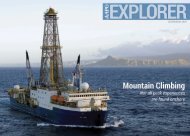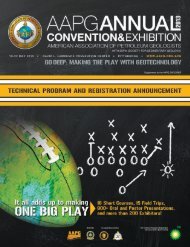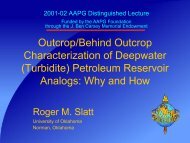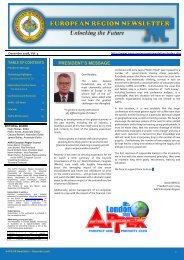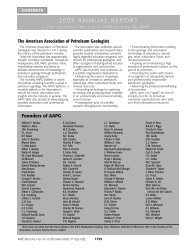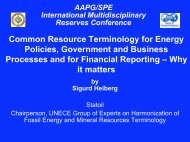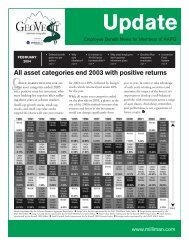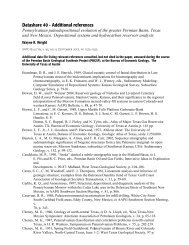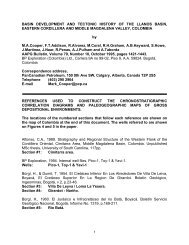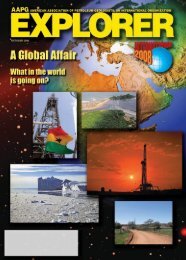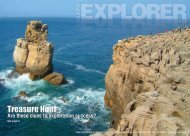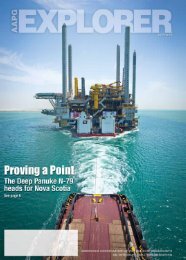Download - American Association of Petroleum Geologists
Download - American Association of Petroleum Geologists
Download - American Association of Petroleum Geologists
Create successful ePaper yourself
Turn your PDF publications into a flip-book with our unique Google optimized e-Paper software.
AAPG<br />
EXPLORER<br />
DIRECTOR’SCORNER<br />
Taking Steps to Foster and Advance Science<br />
By DAVID K. CURTISS, AAPG Executive Director<br />
Here at headquarters we are busy<br />
with final preparations for the trip<br />
to Pittsburgh for AAPG’s Annual<br />
Convention and Exhibition (ACE) from May<br />
19-22. The organizing committee has done<br />
a magnificent job getting ready for this<br />
meeting, and participants will experience a<br />
rich technical program <strong>of</strong> talks and posters<br />
on a wide variety <strong>of</strong> topics.<br />
ACE is one important way AAPG seeks<br />
to achieve its strategic goal <strong>of</strong> being<br />
indispensable to the energy geoscientist,<br />
providing opportunities for scientific and<br />
pr<strong>of</strong>essional growth as well as networking.<br />
Being indispensable is an ambitious goal<br />
– and in my mind it is all about relevance and<br />
value.<br />
Are AAPG’s products and services<br />
relevant to the global petroleum geoscience<br />
community?<br />
Do they provide value to members and<br />
are they attractive to non-members?<br />
Is what we’re currently doing moving us<br />
toward our goal, or do we need to innovate<br />
and seek new ways to provide more relevant<br />
content and value?<br />
Ok, that last one was a rhetorical question:<br />
AAPG must innovate in order to remain<br />
relevant, let alone become indispensable.<br />
We must continually look for new<br />
and better ways to serve the petroleum<br />
geoscience community.<br />
* * *<br />
Our House <strong>of</strong> Delegates will be voting on<br />
a proposal in Pittsburgh that has the potential<br />
to be an innovative step to boost AAPG’s<br />
relevance.<br />
The proposal is to form a new technical<br />
division focused on structural geology and<br />
CURTISS<br />
geomechanics. And the request emerged<br />
from a group <strong>of</strong> experts that have been<br />
meeting at ACE annually for nearly a decade.<br />
They represent both industry and academia,<br />
and are focused on the application <strong>of</strong><br />
structure and geomechanics to the<br />
exploration and production <strong>of</strong> hydrocarbons.<br />
In its evaluation and approval <strong>of</strong> the<br />
request, the Executive Committee saw an<br />
opportunity to support and harness the<br />
commitment and energy <strong>of</strong> this group and<br />
align them with AAPG’s mission <strong>of</strong> advancing<br />
science. If approved, the new <strong>Petroleum</strong><br />
Structure and Geomechanics Division’s<br />
exclusive focus will be on pursuing new<br />
scientific insights and breakthroughs, and<br />
then disseminating those through the many<br />
channels that AAPG provides, including:<br />
u Hedberg conferences.<br />
u Geoscience Technology Workshops<br />
(GTWs).<br />
u Special sessions at ACE and ICE.<br />
u Publications.<br />
u Theme issues <strong>of</strong> the BULLETIN.<br />
The new Division’s members benefit<br />
directly from being part <strong>of</strong> the process that<br />
leads to the insights and breakthroughs.<br />
AAPG’s members and global petroleum<br />
community benefit from access to this<br />
As geologists we are<br />
integrators ... The better<br />
we do this, the more<br />
relevant we will be.<br />
information – and as a global geoscience<br />
<strong>Association</strong> we provide relevant and valuable<br />
content and take a step closer to becoming<br />
indispensable.<br />
* * *<br />
One concern that has been expressed<br />
to me by several members and House<br />
Delegates is that the proposed new Division<br />
is too specialized. After all, most practicing<br />
geologists do structural geology as part <strong>of</strong><br />
their daily work. What makes these Division<br />
folks so special?<br />
My response is threefold:<br />
u First, if structural geology or<br />
geomechanics really appeal to you and<br />
you want to work with your industry and<br />
academic peers to advance this part <strong>of</strong> the<br />
geosciences, then please get involved with<br />
this new Division!<br />
u Second, if your desire is to stay abreast<br />
<strong>of</strong> the leading thinking in the field <strong>of</strong> structural<br />
geology and geomechanics, then take<br />
advantage <strong>of</strong> the opportunities to learn<br />
from this group through the meetings and<br />
publications they produce.<br />
u Third, if you have absolutely no interest<br />
in these disciplines, simply be aware that<br />
AAPG wants to support those who are<br />
strongly committed to the advancement <strong>of</strong><br />
the petroleum geosciences.<br />
But if you fall into that third category, I’d<br />
ask you to consider: Which geoscience<br />
discipline or practice does appeal to<br />
you? Is it sedimentology and stratigraphy,<br />
geochemistry, petroleum systems and<br />
basin modeling, reservoir characterization,<br />
development geology, risk assessment or<br />
reserves calculations?<br />
I can foresee technical divisions in<br />
these areas – and more – if we can identify<br />
a core group <strong>of</strong> industry practitioners<br />
and academics who want to take up the<br />
challenge <strong>of</strong> advancing the science.<br />
As geologists we are integrators. We<br />
use the findings from myriad geoscience<br />
disciplines, chemistry, physics, biology<br />
and engineering to find oil and natural gas.<br />
Bridging the gap between the specialist and<br />
generalist is an essential part <strong>of</strong> our job as an<br />
<strong>Association</strong>. The better we do this, the more<br />
relevant we will be.<br />
Will this approach work? Can AAPG<br />
create a better system to foster and support<br />
scientific advances and breakthroughs?<br />
Can we more effectively disseminate that<br />
content to our members and customers to<br />
demonstrate our relevance?<br />
Can we truly become indispensable?<br />
Let’s take this step forward and find out.<br />
DIVISIONSREPORT<br />
EMD Will Have a High Pr<strong>of</strong>ile in Pittsburgh<br />
By ANDREA REYNOLDS, EMD President<br />
In my 15 years as an AAPG member,<br />
I’ve actively been involved in<br />
planning and serving in various roles<br />
during AAPG’s Annual Convention and<br />
Exhibition (ACE), particularly when I lived<br />
in Houston.<br />
“Space City” is on the regular rotation<br />
for the ACE, most recently hosting the<br />
meeting in 2002, 2006 and 2011 (and<br />
again next April). Other petroleum<br />
industry-friendly cities such as Denver,<br />
San Antonio, Calgary, New Orleans and<br />
Dallas also attract a fair share <strong>of</strong> AAPG<br />
ACE events.<br />
The 2013 ACE, however, is being held<br />
in a new location, planned in the “City<br />
<strong>of</strong> Bridges” and situated a stone’s throw<br />
from Titusville, home <strong>of</strong> the 1859 Drake<br />
discovery well and the birthplace <strong>of</strong> the<br />
U.S. oil industry.<br />
Few likely had the foresight that<br />
Pittsburgh would someday host an<br />
ACE, and I certainly did not envision a<br />
relocation back to my northeastern U.S.<br />
roots while working for a major energy<br />
company!<br />
However, in these times <strong>of</strong> rampant<br />
resurgence in onshore plays, one should<br />
perhaps expect the unexpected. I am<br />
proud to say Pittsburgh has been my<br />
adopted home for the past two years,<br />
and the Eastern Section will be hosting<br />
its first ACE in nearly 30 years.<br />
REYNOLDS<br />
In the years since Range Resources’<br />
Renz #1 discovery well in the Marcellus<br />
Shale, Pittsburgh has emerged as the<br />
“it” city as more operators develop<br />
their position in the Appalachian Basin<br />
and new plays such as the Utica/Point<br />
Pleasant have matured.<br />
Like Pittsburgh, EMD is experiencing<br />
a wave <strong>of</strong> renewed excitement as<br />
advancing technologies unlock<br />
previously economically challenged<br />
plays, and new opportunities within EMD<br />
disciplines are becoming more attractive<br />
and feasible.<br />
EMD is truly excited about the<br />
upcoming ACE, and we invite you to join<br />
us for our jam-packed technical program<br />
and events during the meeting. Doug<br />
Patchen, the EMD vice chair for the 2013<br />
ACE, organized an outstanding program<br />
for EMD.<br />
That program includes:<br />
78 MAY 2013 WWW.AAPG.ORG<br />
u Seven oral sessions (Theme 1).<br />
The topics are:<br />
3 Lower Paleozoic<br />
Unconventional Plays <strong>of</strong> the<br />
Northeast U.S.<br />
3 Shale Plays <strong>of</strong> the Americas<br />
(Non-U.S.)<br />
3 The Bakken <strong>Petroleum</strong> System.<br />
3 The Eagle Ford <strong>Petroleum</strong><br />
System.<br />
3 Evaluation <strong>of</strong> European Shales.<br />
3 Worldwide Unconventional<br />
Reservoirs.<br />
3 Shale and Tight Oil Plays from<br />
Around the Globe.<br />
u Four poster sessions (Theme 1):<br />
3 Resource Plays (I and II).<br />
3 Unconventionals (I and II).<br />
u Three field trips:<br />
3 The Marcellus Shale in south-central<br />
Pennsylvania (led by Lee Avary and John<br />
Dennison).<br />
3 Organic-Rich Shales <strong>of</strong> New York<br />
– Core Workshop and Field Trip (Taury<br />
Smith and Jim Leone).<br />
3 Coal Measures <strong>of</strong> Kentucky (Steve<br />
Flint).<br />
u Two short courses:<br />
3 Black Shale Core Workshop<br />
(CoreLab).<br />
3 Hydraulic Fracturing <strong>of</strong> Shale<br />
Reservoirs (Randy LaFollette).<br />
u Finally, this year’s EMD Luncheon,<br />
set Wednesday, May 22, features<br />
Seamus McGraw, author <strong>of</strong> End <strong>of</strong><br />
Country, who will discuss “Comfortable<br />
in Our Ignorance,” which will explain<br />
how extreme voices on both sides <strong>of</strong> the<br />
public debate over shale gas exploration<br />
and development are effectively<br />
undermining efforts to develop the<br />
resource more safely, damaging efforts<br />
to maximize its potential environmental<br />
advantages, and preventing the real<br />
economic benefits from taking hold.<br />
At press time, seats were still available<br />
– but this luncheon is expected to sell<br />
out, so get your tickets while they last!<br />
For more details on McGraw, read his<br />
interview on page 64, or visit his website<br />
at www.seamusmcgraw.com.<br />
* * *<br />
On behalf <strong>of</strong> EMD I was able to be<br />
part <strong>of</strong> this year’s AAPG Congressional<br />
Visit Days, held in mid-April and<br />
organized by Edith Allison, director <strong>of</strong> the<br />
AAPG GEO-DC <strong>of</strong>fice in Washington, D.C.<br />
See EMD, page 48



